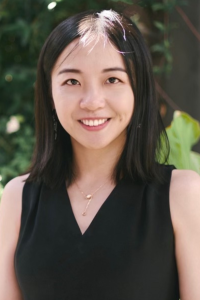Shikun Wang, PhD
- Assistant Professor of Biostatistics (in the Herbert Irving Comprehensive Cancer Center) at CUMC
On the web

Overview
Her methodological research focuses on developing novel statistical methods for health service research using joint modeling of longitudinal and survival data. Dr. Wang’s group is also actively working on developing novel technologies for performing single-cell RNA sequencing, in addition to innovative computational and statistical methods for analyzing the resulting large-scale datasets.
Dr. Wang was born and grew up in Guangzhou, China. She graduated from Zhejiang University with a bachelor's degree in mathematics and Applied Mathematics and earned his master's degree in applied Statistics at University of Michigan, Ann Arbor, where she contributed to research projects in the medical school and cancer center. She completed her PhD in Biostatistics at University of Texas MD Anderson Cancer Center UTHealth Houston Graduate School of Biomedical Sciences.
Academic Appointments
- Assistant Professor of Biostatistics (in the Herbert Irving Comprehensive Cancer Center) at CUMC
Gender
- Female
Credentials & Experience
Committees, Societies, Councils
- American Statistical Association (ASA), Member
- Eastern North American Region International Biometric Society (ENAR), Member
- Western North American Region International Biometric Society (WNAR), Member
- International Chinese Statistical Association (ICSA), Member
Honors & Awards
- 2020: The Antje Wuelfrath Gee and Harry Gee, Jr. Family Legacy Scholarship, Houston, TX
- 2020: GSBS/MDACC Student Travel Award, Houston, TX
- 2020: JSM 2020 LiDS Section Student Paper Award, Alexandria, VA
- 2015: Zhejiang University First-Class Research and Innovation Scholarship, Hangzhou, China
Research
Dr. Wang’s research ideas are inspired by the interesting phenomena that arise from simple observations in her own life. Broadly speaking, her research areas are at the intersection of statistical methodology and collaborative research in clinical sciences. Specifically, She has a keen interest in understanding the influence of medical cost data on the production, dissemination, and use of medical information in health service evaluation. In addition, her research also explores how "learning" affects the decision-making of analysts and policy makers. Her approach is interdisciplinary, integrating tools and insights from biomedicine, statistics, economics, and computer science. Dr. Wang’s work has appeared in high-impact journals such as Annals of Applied Statistics, Biometrics, Journal of Clinical Oncology, etc. She has received multiple awards recognizing the impact of her research.
Research Interest:
- Survival analysis
- Longitudinal analysis
- Health service research
- Clinical trial design
- Single-cell sequencing
- Spatial transcriptomics
- Artificial intelligence
Clinical Trials
Selected Publications
Link: https://projecteuclid.org/journals/annals-of-applied-statistics/volume-17/issue-1/An-extension-of-estimating-equations-to-model-longitudinal-medical-cost/10.1214/22-AOAS1659.full
S. Wang, J. Ning, Y. Shen, Y.T. Shih, Y. Xu, L. Li (2023). An extension of estimating equations to model longitudinal medical cost trajectory with Medicare claims data linked to SEER cancer registry. Annals of Applied Statistics.
Link: https://www.sciencedirect.com/science/article/pii/S0167947322001086?via%3Dihub
S. Wang, Z. Li, L. Lan, J. Zhao, W.J. Zheng, L. Li (2022). GPU accelerated estimation of a shared random effect joint model for dynamic prediction. Computational Statistics and Data Analysis.
Link: https://academic.oup.com/biostatistics/advance-article/doi/10.1093/biostatistics/kxab024/6322379
S. Wang, Y. Shen, Y.T. Shih, Y. Xu, L. Li (2021). Statistical modeling of longitudinal medical cost trajectory: renal cell cancer care cost analyses. Biostatistics.
Link: https://onlinelibrary.wiley.com/doi/10.1002/sim.8505
M. Zhang, Y. Yu, S. Wang, M. Salvatore, L.G. Fritsche, Z. He, and B. Mukherjee (2020). Interaction analysis under misspecification of main effects: Some common mistakes and simple solutions. Statistics in medicine.
Link: https://www.auajournals.org/doi/10.1097/UPJ.0000000000000020
M.E. Caram, S. Wang, P. Tsao, J.J. Griggs, D.C. Miller, B.K. Hollenbeck, P. Lin, and B. Mukherjee (2019). Patient and provider variables associated with systemic treatment of advanced prostate cancer. Urology practice.
Link: https://pubmed.ncbi.nlm.nih.gov/31276025/
M.E. Caram, S. Wang, P.A. Cheng, J.J. Griggs, P. Lin, and B. Mukherjee (2018). Patient and provider variables associated with variation in the systemic treatment of advanced prostate cancer. Journal of Clinical Oncology.